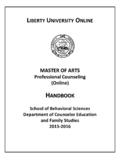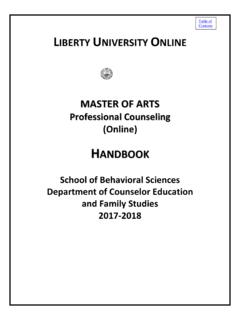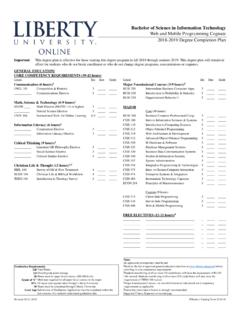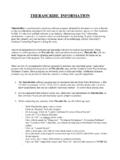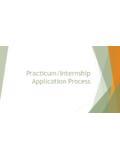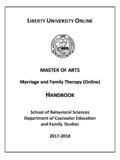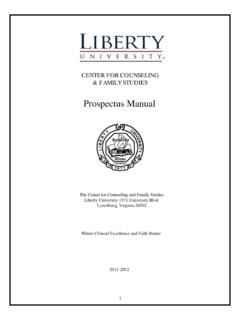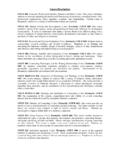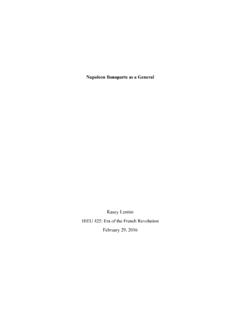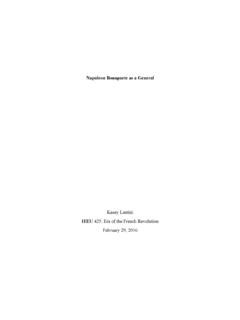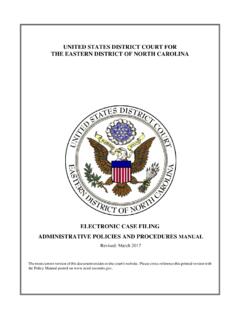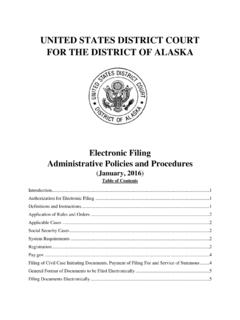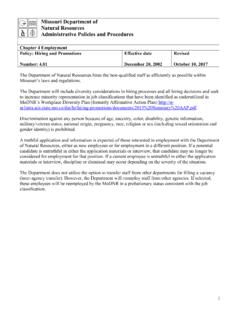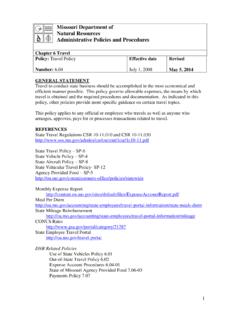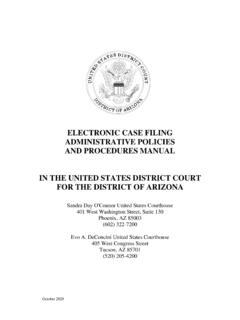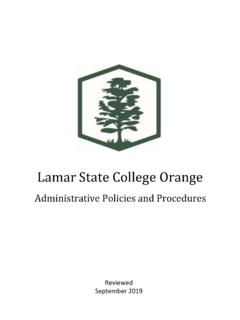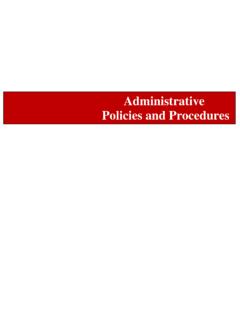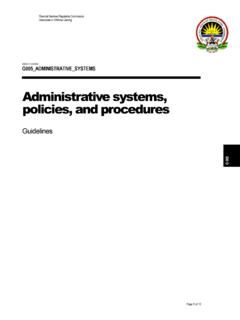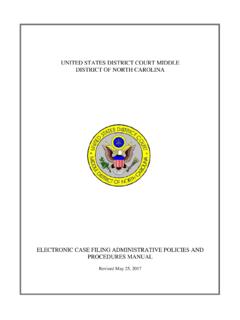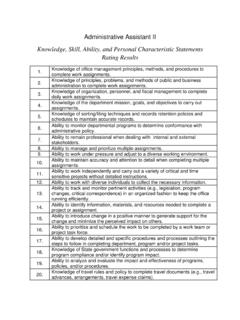Transcription of Section Eight ADMINISTRATIVE POLICIES AND PROCEDURES
1 Sec. 8- ADMINISTRATIVE POLICIES : rev 5-26-2017 Page 1 Student Handbook Section Eight ADMINISTRATIVE POLICIES AND PROCEDURES I. PREAMBLE liberty university School of Law ( liberty Law ) is comprised of a network of students, alumni, faculty, staff, and supporters that together form a community based upon the truth of the Bible. This truth defines our view of community and what values we seek to affirm through our honor codes. At the core of these codes are two key concepts: a belief in the dignity of all persons and an insistence on the existence of objective truth. These concepts are further defined in our foundational statements, including our Doctrinal Statement, our Philosophy of Education and Mission Statement, the Statement of Professional Ethics for the Faculty, and our Law Student Handbook. Together, these statements situate liberty Law within the long tradition of university culture, which in its beginnings was distinctively Christian, designed to preserve and advance truth.
2 Anyone, whether Christian or non-Christian, who shares our values and goals, is both welcome and valued in our community. We want all students to feel comfortable in our community of learning, and we extend to all of our students our personal and academic resources, with the goal of fostering spiritual growth, character development, and the ability to gain knowledge of the theory and practice of law. While we understand that not everyone will agree with the statements that follow, we do expect our students to respect and uphold these standards by abiding by the Personal Honor Code and the Academic Honor Code while enrolled at liberty university . Abiding by the principles and behaviors established in these codes contributes to the success of our students and the strengthening of the liberty community. II. ACADEMIC HONOR CODE A. PREAMBLE The liberty university School of Law Academic Honor Code is an integral part of the law school community.
3 This community consists of individuals of diverse backgrounds and experiences dedicated to obtaining a superior legal education in fidelity to the Christian faith expressed through the Holy Scriptures. Central to preserving this community is the personal commitment of students to conduct themselves in a manner that reflects the highest ideals of moral virtue and professionalism. To this end, the Academic Honor Code sets forth the disciplinary PROCEDURES that apply when academic misconduct by a law student is alleged to have occurred. All students are charged with notice of this Academic Honor Code and the mechanism for its enforcement. B. ACADEMIC MISCONDUCT Sec. 8- ADMINISTRATIVE POLICIES : rev 5-26-2017 Page 2 Student Handbook Academic misconduct includes, but is not limited to, plagiarism, cheating, and falsification 1. Plagiarism Plagiarism is the intentional or reckless failure to give sufficient attribution in traditional academically accepted form to the words, ideas, or data of others that the student has incorporated into work the student submits for academic credit, publication, qualification for a law school organization, or other benefit and that may reasonably mislead the reader as to the true source of the words, ideas, or data.
4 To avoid the appearance of plagiarism, students must conscientiously provide sufficient attribution. Attribution is sufficient if it adequately informs the reader of the true source of the words, ideas, or data. Footnote references alone are not sufficient if material is incorporated within the text verbatim or virtually verbatim. Students who have any question whether they have provided sufficient attribution are responsible for obtaining guidance from their professor or other person to whom they are submitting their work. 2. Cheating Cheating is a form of dishonesty in which a student attempts to give the appearance of a level of knowledge or skill that the student has not obtained, gives unauthorized aid, or wrongly takes advantage of another s work product. Examples include, but are not limited to: Copying from another person s work on an examination or an assignment; or Allowing another student to copy any portion of one s work on an examination or an assignment using unauthorized materials or giving or receiving any other unauthorized assistance on an examination or an assignment; or Taking an examination or completing an assignment for another, or permitting another to take an examination or to complete an assignment for the student; or Failing to immediately stop when the proctor of an exam being administered to the student announces the time allotted for the exam is concluded; or 3.
5 Falsification Falsification is a form of dishonesty in which a student misrepresents the truth, invents facts, or distorts the origin or content of information used as authority. Examples include, but are not limited to: Dishonestly answering or providing information in the law school application process; or Citing a source that is known not to exist; or Sec. 8- ADMINISTRATIVE POLICIES : rev 5-26-2017 Page 3 Student Handbook Attributing to a source ideas and information that are not included in the source; or Citing a source in support of a proposition that is known not to support such proposition; or Citing a source in a bibliography when the source was neither cited in the body of the paper nor consulted; or Intentionally distorting the meaning or applicability of data; or Inventing data or statistical results to support conclusions.
6 C. AFFIRMATIVE DUTIES As future lawyers with the duty under the appropriate state standards governing professional conduct to report ethical violations, liberty law students have the affirmative duty to report promptly to a member of the faculty or administration all circumstances they have reason to believe constitute a violation of the Academic Honor Code. Breach of this duty shall itself constitute a violation of the Academic Honor Code. If requested by any party to a proceeding referenced in 8, it is the duty of every law student to give testimony or evidence relevant to any alleged violation of the Academic Honor Code, and breach of this duty shall itself constitute a breach of the Academic Honor Code. D. PROCEDURE FOR INVESTIGATION, ADJUDICATION, AND SANCTION OF ACADEMIC HONOR CODE VIOLATIONS 1. Processing Allegations When an alleged violation of the Academic Honor Code has been reported to the faculty or administration, the Associate Dean for Academic Affairs (Academic Dean) shall be informed of the allegation.
7 Any member of the administration, faculty, or staff having knowledge of a violation of the Academic Honor Code shall likewise communicate the violation to the Academic Dean. 2. Admission of Violation of Academic Honor Code by Student Where an alleged violation of the Academic Honor Code arises and the student admits the infraction, the Academic Dean may address the allegation in the first instance and may refer the matter to the Dean of the law school with his findings and recommendations without referring the matter to the Conduct Review Committee (CRC). The Dean of the Law School may resolve the matter in the same manner as if the CRC had found by clear and convincing evidence that the student had violated the Academic Honor Code and submitted to the Dean of the Law School its finding. Sec. 8- ADMINISTRATIVE POLICIES : rev 5-26-2017 Page 4 Student Handbook 3.
8 Referral to Conduct Review Committee Where the student alleged to have violated the Academic Honor Code does not admit the allegation and the Academic Dean believes probable cause exists to support the allegation, the Academic Dean shall timely refer the matter to the Conduct Review Committee (CRC) in the manner provided herein. E. DEAN OF LAW SCHOOL NOT DISQUALIFIED FOR CONSULTATION The Academic Dean may discuss with the Dean of the law school an alleged student violation of the Academic Honor Code for advice, counseling, or other intervention even if a student has not admitted guilt to an allegation. Neither referral of the alleged misconduct of a student to the Academic Dean nor action by the Dean of the law school pursuant to the provisions of 8. III. disqualifies the Dean of the law school from future action in the matter should it proceed through the CRC.
9 III. PERSONAL CODE OF HONOR A. PREFACE A chaste, honorable, and virtuous life encompasses many principles, including, but not limited to, respect for authority, respect for the human dignity of others, respect for all institutional POLICIES , avoidance of physically threatening or violent acts towards others, and personal self-control. A violation of these or similar principles may result in serious disciplinary action or, where appropriate, may prompt pastoral counseling. The Personal Code of Honor sets forth the disciplinary PROCEDURES that apply when non-academic misconduct by a law student is alleged to have occurred. Students are charged with notice of this Personal Code of Honor. New students shall be required to sign a statement indicating that they have received and read the Personal Code of Honor. B. CONDUCT THAT UNDERMINES THE SAFETY, MISSION, OR REPUTATION OF THE SCHOOL Acts that may reasonably undermine the safety, mission, or reputation of the law school or university are violations of the Personal Code of Honor.
10 Examples of such acts include, but are not limited to: Commission of a crime or an intentional tort; or Violations of institutional POLICIES , including standards of dress; or Conduct that may reasonably tend to cause public embarrassment to the law school, the university , or their representatives, students, or employees; or Knowingly filing false reports of violations of law school rules, except that no sanction shall follow from reports made in good faith. Sec. 8- ADMINISTRATIVE POLICIES : rev 5-26-2017 Page 5 Student Handbook C. SEXUAL, PHYSICAL, OR VERBAL MISCONDUCT Respect for the dignity of each individual as a person created in God s image is fundamental to the institutional culture desired at liberty university School of Law. Misconduct that is contrary to the teachings of the Christian faith and constitutes a violation of the law school s Personal Code of Honor includes, but is not limited to: Sexually-oriented joking or comments; or Unwelcome touching or any touching of a sexual nature; or Sexually-oriented comments about an individual s body; or Offensive or crude language directed at individuals or a group of individuals; or Display of objects or pictures that depict nudity or are otherwise sexual in nature; or Persistent, unwanted attempts to change a casual or friendly relationship into a romantic or more intimate one; or Verbal or physical abuse.
